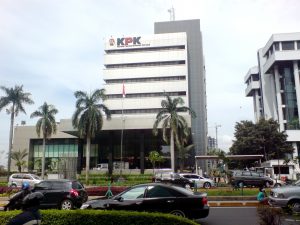On November 25, Indonesia’s Anti-Corruption Commission announced that it had arrested the country’s Minister of Maritime Affairs and Fisheries as part of an investigation into the lucrative export of lobster larvae. Edhy Prabowo was detained at Jakarta’s airport after turning from a work trip to the United States, the deputy chairman of the Corruption Eradication Commission, Nurul Ghufron, told local media.
If charged with a crime, he could become the third member of President Joko “Jokowi” Widodo’s cabinet to be charged with corruption by the country’s anti-graft commission, known in Indonesian as Komisi Pemberantasan Korupsi (KPK). Ghufron said that KPK investigators were still questioning Edhy and that they would make another announcement about the case soon.
Lobsters are among the most profitable fishery product in Indonesia, and their larvae have long been a target for smuggling. In 2019 alone, the illegal export of lobster hatchlings and larvae cost the country 900 billion rupiah (around $64 million) in lost revenue, according to PPATK, a national money laundering watchdog group.
Earlier this year, Edhy reversed a ban on the export of lobster larvae imposed by his predecessor, Susi Pudjiastuti, in a bid to protect the declining wild population of the crustaceans. He allocated around 70 percent of Indonesia’s lobster larvae for domestic cultivation in aquaculture farms, while the rest were earmarked for export. The larvae are typically sold to buyers in Vietnam, Singapore and China, where they are raised and subsequently sold for considerable profit.
According to an investigation by the news magazine Tempo, Edhy’s office promptly granted export permits to 31 companies, some of whose owners, directors or executives were politicians from Edhy’s Great Indonesia Movement Party, or Gerindra, formerly a rival to Jokowi’s party.
On Wednesday, Jokowi said that he respected the KPK’s decision to arrest Edhy. “We respect the ongoing legal process at the KPK. We respect it. And I believe KPK implements transparency, open, and professional work. The government consistently supports the efforts to prevent and eradicate corruption,” Jokowi said in a statement.
Still, the arrest looks bad for Jokowi, who clinched the presidency in 2014 after campaigning on promises to root out corruption. Two previous members of his cabinet have already been sentenced to prison terms in corruption cases.
The first to go down was former Social Affairs Minister Idrus Marham, who in April 2019 was sentenced to three years in prison for accepting bribes from a businessmen in return for the rights to develop a coal-fired power plant project in Sumatra. Then, in June of this year, former Youth and Sport Minister Imam Nahrawi was sentenced to seven years imprisonment after he was found guilty of embezzling money from a National Sports Committee grant.
The arrest could also loom as a test for the fragile coalition between Gerindra and Jokowi’s PDI-P, which fought a bitter presidential election in 2019. After the election, Jokowi shocked many observers (particularly in the West) when he appointed Edhy to his cabinet along with Gerindra’s two-time presidential candidate Prabowo Subianto (no relation), who became defense minister. As Aaron Connelly of Singapore’s International Institute for Strategic Studies noted, Prabowo’s response to the arrest of his ally “will answer key questions about the durability of Jokowi’s coalition.”
Edhy Prabowo’s arrest also marks another notch for Indonesia’s pioneering anti-corruption body, which was established in 2003 as a condition of the International Monetary Fund’s massive bailout to Indonesia following the Asian financial crisis in 1997-98.
Despite constant attempts to attack the KPK or weaken its powers – including a September 2019 amendment to the 2002 KPK Law that threatened to neuter its investigative ability – the commission has shown a remarkable degree of pluck and independence. In a hostile political environment, it has been sustained by strong levels of support from the public, which has often viewed it as a plucky cicak (gecko) fighting the powerful buaya (crocodiles) that infest Indonesia’s political system.
The KPK has helped drag Indonesia up the rankings of Transparency International’s Corruption Perception Index, from 122nd place that 2003 up to 85th place in 2019.
As that ranking shows, corruption remains a serious issue in Indonesia. But those committing it can be never be fully confident that somebody isn’t watching.

































